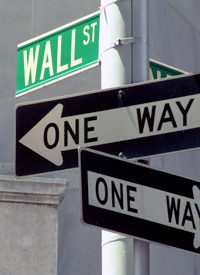
“Greed, for a lack of a better word, is good. Greed works. Greed clarifies, cuts through and captures the essence of the evolutionary spirit,” says a disdainful Michael Douglas, in Oliver Stone’s 1987 blockbuster movie Wall Street. This embellished train of propaganda is typical of populist bureaucrats and Hollywood socialites. All corporations are “evil, capitalist thugs” who rob the poor and exploit the middle class, they say. But omitted is the fact that these “evil, capitalist thugs” are the stimulators of job growth and contributors to economic prosperity.
The evolution of markets and fundamentals of economic activity are demonstrated throughout history, particularly through tax policies. Naturally, fluctuations in tax policy influence government revenue and economic growth. The question is how.
John F. Kennedy captured the presidency in 1961, taking hold of a government that taxed 91 percent on the top federal income tax bracket. Kennedy understood “that tax rates are too [high], and tax revenues too low, and the soundest way to raise revenues in the long run is to cut [taxes].” A few months after his tragic assassination, Kennedy’s tax cut package reduced the top marginal rate by 21 percent.
Four years later, one million jobs were added to America’s workforce and the economy grew 35 percent. Critics of the Kennedy tax cuts suspected a significant drop in tax revenue. But with fierce economic growth, resulting from an expanding private sector, in this same four-year period total income tax receipts escalated by 20 billion dollars, an increase of almost 30 percent.
Changes in tax policies produce cyclical outcomes, as similar results stemmed from the Harding-Coolidge tax cuts of the early 20th century, the Reagan tax cuts of the 1980s, and the Bush tax cuts of the early 21st century. Markets respond positively to pro-business tax policies because they decrease expenses and assure corporate independence.
With President Bush’s Economic Growth and Tax Relief Reconciliation of 2001 and Jobs and Growth Tax Relief Reconciliation Act of 2003 came a surge of economic production. These two sweeping pieces of legislation contained across-the-board tax cuts, including income, estate, and investment taxes.
Critics of the Bush tax cuts claimed tax revenues would plunge and the social class gap would broaden — and that as a result, the economy would suffer. However, between 2004 and 2006 tax revenues increased by 20 percent, the largest two-year increase since 1965-1967. And similar to the Kennedy tax cuts, four years later millions of jobs were added to the workforce — five million of them.
In spite of President Obama’s tradeoff with Republicans over the Bush tax cuts and unemployment benefits, his disdain for the upper class pierces deep. He relentlessly condemns the wealthy, as he politicizes an obscure concept of “fairness.” But what is fair about 9.8 percent unemployment, or businesses struggling to pay their bills? While the administration panders over flowery rhetoric and self-righteousness, businesses are flailing and unemployed Americans remain jobless.
Why increase the financial burden on investors and business owners — while inflating consumer prices and risking employee benefit cuts and layoffs — during a time when profits are low and capital is scarce? As a business owner, why expand your business and hire new employees if you know what little profit you still earn will be confiscated by the government?
Despite what Washington bureaucrats believe, the private sector is perceptive; business leaders make intelligent business decisions, which oftentimes — particularly in a down economy — results in conservative behavior. CEO’s and managers evaluate tomorrow’s economy, and when the future looks bleak, they are reluctant to expand and hire new employees. Hiking taxes, now more than ever, will further dwindle the workforce and create a lethargic corporate base.
In the end, the human “greed” that lies within is what drives the economy. History reveals that economic power lies within the market, driven by individuality and private enterprise. And to rise above economic calamity, our political leaders must base decisions on historical data and sound economic policy, and voters must evade the frivolous debate over “fairness” — because what is “fair” is often flawed.



